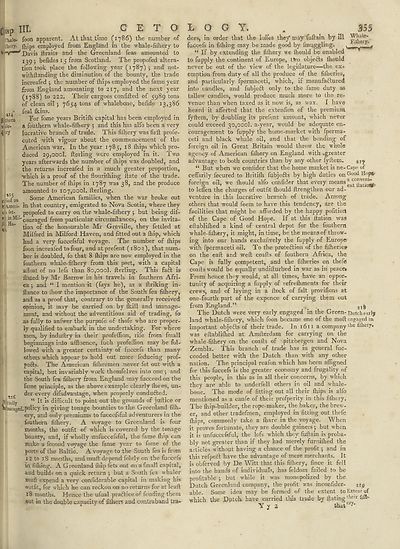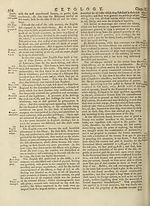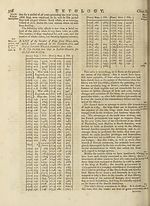Encyclopaedia Britannica, or, a Dictionary of arts, sciences, and miscellaneous literature : enlarged and improved. Illustrated with nearly six hundred engravings > Volume 5, BUR-CHI
(379) Page 355
Download files
Complete book:
Individual page:
Thumbnail gallery: Grid view | List view

llhery.
(sap HI- C E T O
" ^ale- foon apparent. At that time (1786) the number of
{hips employed from England in the whale-fiihery to
Davis {traits and the Greenland feas amounted to
139 j belides 15 from Scotland. The propofed altera¬
tion took place the following year (1787) ; and not-
withftanding the diminution of the bounty, the trade
increafed j the number of flaps employed the fame year
from England amounting to 2x7, and the next year
(1788) to 222. Their cargoes confifted of 5989 tons
of clean oil; 7654 tons of whalebone, beflde 13,386
feal {kins.
For fome years Britifli capital has been employed in
a fouthern whale-fifhery ; and this has alfo been a very
lucrative branch of trade. This fifliery was firft profe-
cuted with vigour about the commencement of the
American war. In the year 1785, 18 {hips which pro¬
duced 29,000!. fterling were employed in it. Two
years afterwards the number of {flips was doubled, and
the returns increafed in a much greater proportion,
which is a proof of the flouriifling ftate of the trade.
The number of {flips in 1787 was 38, and the produce
amounted to 107,0001. fterling.
Some American families, when the war broke out
114
£ them
n ile-
«5
,'ied on
$yicu on 7
Y vmeri- in that country, emigrated to Nova Scotia, where they
0 s fet-
in Mil'
Ha-
propofed to carry on the whale-fifliery j but being dif-
couraged from particular circumflances, on the invita¬
tion of the honourable Mr Greville, they fettled at
Milford in Milford Haven, and fitted out a fhip, which
had a very fuccefsful voyage. The number of {flips
foon increafed to four, and at prefent (1803), that num¬
ber is doubled, fo that 8 {flips are now employed in the
fouthern whale-fiftiery from this port, with a capital
afloat of no lefs than 8o,oool. fterling. This fa£t is
ftaied by Mr Barrow in his travels in fouthern Afri¬
ca ; and “ I mention it (fays he), as a ftriking in-
ftance to (flow the importance of the South fea fifliery,
and as a proof that, contrary to the generally received
opinion, it may be carried on by {kill and manage¬
ment, and without the adventitious aid of trading, fo
as fully to anfwer the purpofe of thofe who are proper¬
ly qualified to embark in the undertaking. For where
men, by induftry in their profeflion, rife from fmall
beginnings into affluence, fuch profefflon may be fol¬
lowed with a greater certainty of fuccefs than many
others which appear to hold out more feducing prof-
pccts. The American fiftiermen never fet out with a
capital, but invariably work themfelves into one •, and
the South fea fiiflery from England may fucceed on the
fame principle, as the above example clearly (hews, un¬
der every difadvantage, when properly condu&ed.
“ It is difficult to point out the grounds of juftice or
Waged.policy in giving tonage bounties to the Greenland filh-
ery, and only premiums to fuccefsful adventurers in the
fouthern fifliery. A voyage to Greenland is four
months, the outfit of which is covered by the tonage
bounty, and, if wholly unfuccefsful, the fame {flip can
make a fecond voyage the fame year to fome of the
ports of the Baltic. A voyage to the South fea is from
12 to 18 months, and muft depend folely on the fuccefs
in fifliing. A G reenland {flip fets out on a fmall capital,
and builds on a quick return ; but a South fea whaler
muft expend a very considerable capital in making his
outfit, for which he can reckon on no returns for at leaft
18 months. Hence the ufual practice of fending them
.out in the double capacity of filflcrs and contraband tra¬
ins
jt tally
LOGY. . 355
ders, in order that the Ioffes they may fuftain by ill
fuccefs in fifliing may be made good by fmuggling. , 1 ,
“ If by extending the fifliery we fliould be enabled
to fupply the continent of Europe, two objects ftiould
never be out of the vieiv of the legiflature—the ex¬
emption from duty of all the produce of the fiflieries,
and particularly fpermaceti, which, if manufactured
into candles, and fubje£t only to the fame duty as
tallow candles, would produce much more to the re¬
venue than when taxed as it now is, as wax. I have
heard it afferted that the extenfion of the premium
fyftem, by doubling its prefent amount, which never
could exceed 30,000k a-year, would be adequate en¬
couragement to fupply the home-market with fperma¬
ceti and black whale oil, and that the bonding of
foreign oil in Great Britain would throw the whole
agency of American fifliery on England with ^greater
advantage to both countries than by any other fyftem. 2if
“ But when we conlider that the home market is ne- Cape of
ceffarily fecured to Britifli fubjefts by high duties on Good Hope
foreign oil, we ftiould alfo confider that every means ^
to leflen the charges of outfit ftiould ftrengthen our ad¬
venture in this lucrative branch of trade. Among
others that would feem to have this tendency, are the
facilities that might be afforded by the happy pofitiorl
of the Cape of Good Hope. If at this itation was
eftabliftied a kind of central depot for the fouthern
whale-fiftiery, it might, in time, be the means of throw¬
ing into our hands exclufively the fupply of Europe?
with fpermaceti oil. To the protedlion of the fiflieries-
on the eaft and weft coafts of fouthern Africa, the
Cape is fully competent, and the fiftieries on thefe
coafts would be equally undifturbed in war as in peace*
From hence they would, at all times, have an oppor¬
tunity of acquiring a fupply of refreftiments for their
crews, and of laying in a ftoek of fait provifions at
one-fourth part of the expence of carrying them out
from England.” 2I^
The Dutch were very early engaged in the Green-p)utch early
land whale-fifliery, which foon became one of the moft engaged in
important objects of their trade. In 1611 a company ftie
was eftabliftied at Amfterdam for carrying on the
whale-fiftiery on the coafts of pitzbergen and Nova
Zembla. This branch of trade has in general fuc-
ceeded better with the Dutch than with any other
nation. The principal reafon which has been affigned
for this fuccefs is the greater economy and frugality of
this people, in this as in all their concerns, by which
they are able to underfell others in oil and whale¬
bone. The mode of fitting out all their ftiips is alfo
mentioned as a caufe of their profperity in this fiftiery.
The {hip-builder, the rope-maker, the baker, the brew¬
er, and other tradefmen, employed in fitting out thefe
ftiips, commonly take a {bare in the voyage. When
it proves fortunate, they are double gainers j but when
it is unfuccefsful, the lofs which they fuftain is proba¬
bly not greater than if they had merely furniflied the
articles without having a chance of the profit ; and in
this refpeft have the advantage of mere merchants. It
is obferved by De Writt that this fiftiery, finee it fell
into the hands of individuals, has feldom failed to be
profitable •, but while it was monopolized by the
Dutch Greenland company, the profit was inconfider- 2lp
able. Some idea may be formed of the extent to Extent of
which the Dptch have carried lifts trade by ftating their fifth.
Y y 2 thater^’
(sap HI- C E T O
" ^ale- foon apparent. At that time (1786) the number of
{hips employed from England in the whale-fiihery to
Davis {traits and the Greenland feas amounted to
139 j belides 15 from Scotland. The propofed altera¬
tion took place the following year (1787) ; and not-
withftanding the diminution of the bounty, the trade
increafed j the number of flaps employed the fame year
from England amounting to 2x7, and the next year
(1788) to 222. Their cargoes confifted of 5989 tons
of clean oil; 7654 tons of whalebone, beflde 13,386
feal {kins.
For fome years Britifli capital has been employed in
a fouthern whale-fifhery ; and this has alfo been a very
lucrative branch of trade. This fifliery was firft profe-
cuted with vigour about the commencement of the
American war. In the year 1785, 18 {hips which pro¬
duced 29,000!. fterling were employed in it. Two
years afterwards the number of {flips was doubled, and
the returns increafed in a much greater proportion,
which is a proof of the flouriifling ftate of the trade.
The number of {flips in 1787 was 38, and the produce
amounted to 107,0001. fterling.
Some American families, when the war broke out
114
£ them
n ile-
«5
,'ied on
$yicu on 7
Y vmeri- in that country, emigrated to Nova Scotia, where they
0 s fet-
in Mil'
Ha-
propofed to carry on the whale-fifliery j but being dif-
couraged from particular circumflances, on the invita¬
tion of the honourable Mr Greville, they fettled at
Milford in Milford Haven, and fitted out a fhip, which
had a very fuccefsful voyage. The number of {flips
foon increafed to four, and at prefent (1803), that num¬
ber is doubled, fo that 8 {flips are now employed in the
fouthern whale-fiftiery from this port, with a capital
afloat of no lefs than 8o,oool. fterling. This fa£t is
ftaied by Mr Barrow in his travels in fouthern Afri¬
ca ; and “ I mention it (fays he), as a ftriking in-
ftance to (flow the importance of the South fea fifliery,
and as a proof that, contrary to the generally received
opinion, it may be carried on by {kill and manage¬
ment, and without the adventitious aid of trading, fo
as fully to anfwer the purpofe of thofe who are proper¬
ly qualified to embark in the undertaking. For where
men, by induftry in their profeflion, rife from fmall
beginnings into affluence, fuch profefflon may be fol¬
lowed with a greater certainty of fuccefs than many
others which appear to hold out more feducing prof-
pccts. The American fiftiermen never fet out with a
capital, but invariably work themfelves into one •, and
the South fea fiiflery from England may fucceed on the
fame principle, as the above example clearly (hews, un¬
der every difadvantage, when properly condu&ed.
“ It is difficult to point out the grounds of juftice or
Waged.policy in giving tonage bounties to the Greenland filh-
ery, and only premiums to fuccefsful adventurers in the
fouthern fifliery. A voyage to Greenland is four
months, the outfit of which is covered by the tonage
bounty, and, if wholly unfuccefsful, the fame {flip can
make a fecond voyage the fame year to fome of the
ports of the Baltic. A voyage to the South fea is from
12 to 18 months, and muft depend folely on the fuccefs
in fifliing. A G reenland {flip fets out on a fmall capital,
and builds on a quick return ; but a South fea whaler
muft expend a very considerable capital in making his
outfit, for which he can reckon on no returns for at leaft
18 months. Hence the ufual practice of fending them
.out in the double capacity of filflcrs and contraband tra¬
ins
jt tally
LOGY. . 355
ders, in order that the Ioffes they may fuftain by ill
fuccefs in fifliing may be made good by fmuggling. , 1 ,
“ If by extending the fifliery we fliould be enabled
to fupply the continent of Europe, two objects ftiould
never be out of the vieiv of the legiflature—the ex¬
emption from duty of all the produce of the fiflieries,
and particularly fpermaceti, which, if manufactured
into candles, and fubje£t only to the fame duty as
tallow candles, would produce much more to the re¬
venue than when taxed as it now is, as wax. I have
heard it afferted that the extenfion of the premium
fyftem, by doubling its prefent amount, which never
could exceed 30,000k a-year, would be adequate en¬
couragement to fupply the home-market with fperma¬
ceti and black whale oil, and that the bonding of
foreign oil in Great Britain would throw the whole
agency of American fifliery on England with ^greater
advantage to both countries than by any other fyftem. 2if
“ But when we conlider that the home market is ne- Cape of
ceffarily fecured to Britifli fubjefts by high duties on Good Hope
foreign oil, we ftiould alfo confider that every means ^
to leflen the charges of outfit ftiould ftrengthen our ad¬
venture in this lucrative branch of trade. Among
others that would feem to have this tendency, are the
facilities that might be afforded by the happy pofitiorl
of the Cape of Good Hope. If at this itation was
eftabliftied a kind of central depot for the fouthern
whale-fiftiery, it might, in time, be the means of throw¬
ing into our hands exclufively the fupply of Europe?
with fpermaceti oil. To the protedlion of the fiflieries-
on the eaft and weft coafts of fouthern Africa, the
Cape is fully competent, and the fiftieries on thefe
coafts would be equally undifturbed in war as in peace*
From hence they would, at all times, have an oppor¬
tunity of acquiring a fupply of refreftiments for their
crews, and of laying in a ftoek of fait provifions at
one-fourth part of the expence of carrying them out
from England.” 2I^
The Dutch were very early engaged in the Green-p)utch early
land whale-fifliery, which foon became one of the moft engaged in
important objects of their trade. In 1611 a company ftie
was eftabliftied at Amfterdam for carrying on the
whale-fiftiery on the coafts of pitzbergen and Nova
Zembla. This branch of trade has in general fuc-
ceeded better with the Dutch than with any other
nation. The principal reafon which has been affigned
for this fuccefs is the greater economy and frugality of
this people, in this as in all their concerns, by which
they are able to underfell others in oil and whale¬
bone. The mode of fitting out all their ftiips is alfo
mentioned as a caufe of their profperity in this fiftiery.
The {hip-builder, the rope-maker, the baker, the brew¬
er, and other tradefmen, employed in fitting out thefe
ftiips, commonly take a {bare in the voyage. When
it proves fortunate, they are double gainers j but when
it is unfuccefsful, the lofs which they fuftain is proba¬
bly not greater than if they had merely furniflied the
articles without having a chance of the profit ; and in
this refpeft have the advantage of mere merchants. It
is obferved by De Writt that this fiftiery, finee it fell
into the hands of individuals, has feldom failed to be
profitable •, but while it was monopolized by the
Dutch Greenland company, the profit was inconfider- 2lp
able. Some idea may be formed of the extent to Extent of
which the Dptch have carried lifts trade by ftating their fifth.
Y y 2 thater^’
Set display mode to:
![]() Universal Viewer |
Universal Viewer | ![]() Mirador |
Large image | Transcription
Mirador |
Large image | Transcription
Images and transcriptions on this page, including medium image downloads, may be used under the Creative Commons Attribution 4.0 International Licence unless otherwise stated. ![]()
| Permanent URL | https://digital.nls.uk/192989196 |
|---|
| Attribution and copyright: |
|
|---|
| Description | Ten editions of 'Encyclopaedia Britannica', issued from 1768-1903, in 231 volumes. Originally issued in 100 weekly parts (3 volumes) between 1768 and 1771 by publishers: Colin Macfarquhar and Andrew Bell (Edinburgh); editor: William Smellie: engraver: Andrew Bell. Expanded editions in the 19th century featured more volumes and contributions from leading experts in their fields. Managed and published in Edinburgh up to the 9th edition (25 volumes, from 1875-1889); the 10th edition (1902-1903) re-issued the 9th edition, with 11 supplementary volumes. |
|---|---|
| Additional NLS resources: |
|

